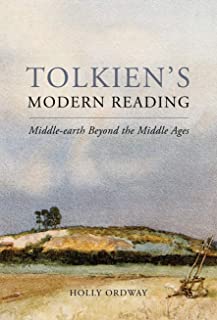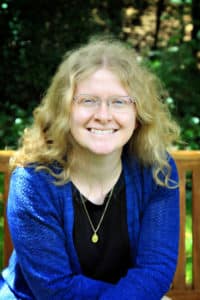Ordway Makes a Compelling Case …
Holly Ordway takes issue with some of the received wisdom about J.R.R. Tolkien. Specifically, she rejects the notion that Tolkien saw nothing of merit in anything written after the Middle Ages, that his Middle-earth saga was influenced only by literature and history prior to Chaucer. In Tolkien’s Modern Reading: Middle-Earth Beyond the Middle Ages, Ordway respectfully disagrees, and makes her case. And a compelling case it is.
The Cardinal Francis George Fellow of Faith and Culture for the Word on Fire Institute and a visiting professor of apologetics at Houston Baptist University, Ordway received a Ph.D. in English from the University of Massachusetts Amherst. She is a subject editor for the Journal of Inklings Studies. She’s published two previous books, Apologetics and the Christian Imagination: An Integrated Approach to Defending the Faith (2017) and Not God’s Type: An Atheist Academic Lays Down Her Arms (2014). And she’s written numerous articles and chapters of anthologies on Tolkien, C.S. Lewis, literature, philosophy, the Inklings, and related subjects.

She considers a number of writers as more than theoretical influences on Tolkien and his own writings. These include George MacDonald, William Morris, Rider Haggard, C.S. Lewis, and several others. Tolkien read works of science fiction by authors like Ray Bradbury, Isaac Asimov, and Edgar Rice Burroughs, among many others. He read ghost stories; children’s stories like Peter Pan and the works of Beatrix Potter; and detective stories by such writers as Agatha Christie, John Buchan, and Sir Arthur Conan Doyle. He read The Wind in the Willows and Lord of the Flies. He read poets like Robert Browning, Henry Wadsworth Longfellow, and John Masefield. In an appendix, Ordway includes a comprehensive list of Tolkien’s modern readings, which goes on for 10 full pages.
But Ordway goes beyond simply providing a catalogue of what Tolkien read. She shows how specific contemporary works likely influenced almost all his Middle-earth writings. She doesn’t dispute that the Middle Ages were a heavy influence. But she demonstrates that to attribute the literary influences on Tolkien only to the Middle Ages results in a limited and flawed understanding.

Holly Ordway
Where did this “Tolkien read nothing created after 1100 A.D.” idea come from? Ordway points to Humphrey Carpenter, Tolkien’s first official biographer. Carpenter first approached the job of writing the biography in what he later admitted was a rather slap-dash manner. The first draft was decidedly rejected by Tolkien’s son and literary executor, Christopher Tolkien. The final manuscript was extensively rewritten and edited, but it still contained a number of flaws. One of those flaws was the idea that Tolkien read only works from the Middle Ages. And the idea took root and flourished. It didn’t help clarification that the Carpenter biography remains the only one authorized by the family.
Ordway makes her case. She’s an academic, but she writes in a highly accessible style. Tolkien’s Modern Reading is not only a welcome addition to the Tolkien literary universe. It also greatly enlarges our understanding of the writer and the influences on his work.
Photo by D3RX, Creative Commons, via Flickr. Post by Glynn Young.
How to Read a Poem uses images like the mouse, the hive, the switch (from the Billy Collins poem)—to guide readers into new ways of understanding poems. Anthology included.
“I require all our incoming poetry students—in the MFA I direct—to buy and read this book.”
—Jeanetta Calhoun Mish
- Longfellow’s “Paul Revere’s Ride”: Creating a National Legend - April 17, 2025
- Poets and Poems: Katie Kalisz and “Flu Season” - April 15, 2025
- Poets and Poems: Michelle Ortega and “When You Ask Me, Why Paris?” - April 10, 2025


Leave a Reply